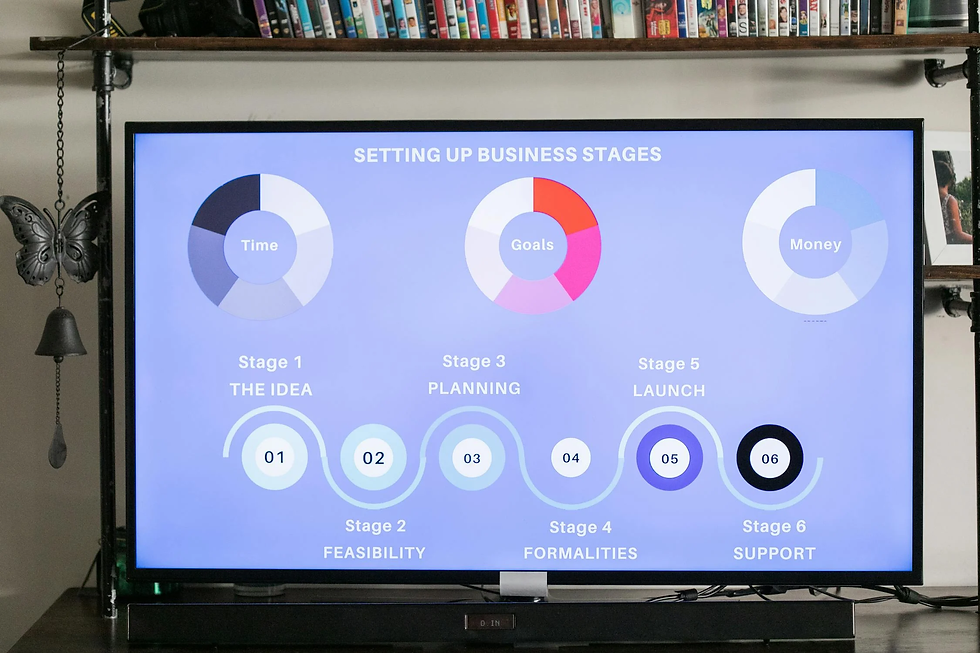Financial Planning for Women: Empowering Your Business Journey
- Rebecca Ryan
- Oct 25, 2024
- 4 min read
In today's dynamic business landscape, financial planning is essential for success, especially for women entrepreneurs. As small business owners, you face unique challenges and opportunities that require strategic financial management.
This guide will explore effective financial planning for women, helping you to not only navigate these challenges but also thrive in your entrepreneurial journey.
The Importance of Financial Planning
Financial planning is the process of setting financial goals, assessing your current financial situation, and creating a roadmap to achieve those goals. For women business owners, financial planning can be particularly empowering. It allows you to take control of your finances, make informed decisions, and ultimately build a sustainable business.
Understanding Your Financial Position
Before you can plan for the future, it’s crucial to understand where you currently stand financially. Start by evaluating your business's income, expenses, assets, and liabilities. This assessment will give you a clear picture of your financial health and help you identify areas for improvement.
Income: Analyze your revenue streams. Are they stable and predictable, or do they fluctuate significantly?
Expenses: Categorize your business expenses and identify any areas where you can cut costs without sacrificing quality.
Assets and Liabilities: Create a balance sheet to see what you own versus what you owe. This will help you gauge your overall financial standing.
Setting Financial Goals
Once you have a clear understanding of your financial position, it’s time to set realistic financial goals. These goals should be specific, measurable, achievable, relevant, and time-bound (SMART). Here are some examples of financial goals for women business owners:
Increase Revenue by 20% in One Year: This goal can be achieved by expanding your product offerings, increasing your marketing efforts, or exploring new sales channels.
Reduce Monthly Expenses by 15%: Identify non-essential expenses that can be minimized or eliminated.
Build an Emergency Fund of 6 Months’ Expenses: This will provide a financial cushion during tough times.
Budgeting: A Cornerstone of Financial Planning
Budgeting is a vital part of financial planning for women. A well-structured budget helps you allocate resources effectively and ensures you stay on track to meet your financial goals. Here are some steps to create an effective budget:
Track Your Income and Expenses: Use budgeting tools or software to monitor your cash flow regularly.
Categorize Your Expenses: Break down your expenses into fixed (rent, utilities) and variable (marketing, supplies) categories.
Adjust as Necessary: Review your budget monthly to adjust for any changes in your business operations or financial goals.
Building Your Credit Profile
As a small business owner, your credit profile plays a significant role in your financial planning. A strong credit score can help you secure better financing options and lower interest rates. Here’s how you can improve and maintain your credit:
Pay Your Bills on Time: Timely payments are crucial for maintaining a good credit score.
Keep Your Credit Utilization Low: Aim to use less than 30% of your available credit.
Monitor Your Credit Report: Regularly check your credit report for errors and dispute any inaccuracies.
Investing in Your Business
Investing in your business is a key component of financial planning for women. Whether you’re considering new technology, hiring additional staff, or launching a marketing campaign, strategic investments can yield significant returns. Here are some tips for smart investments:
Research Opportunities: Always conduct thorough research before making any investment decisions.
Prioritize High-Impact Investments: Focus on areas that will drive growth and profitability.
Consider Seeking Professional Advice: Financial advisors can provide valuable insights and help you make informed decisions.
Planning for Retirement
As a small business owner, planning for retirement may not always be top of mind, but it is essential for your long-term financial security. Explore retirement savings options, such as:
Solo 401(k): This plan is designed for self-employed individuals and allows you to contribute both as an employee and employer.
SEP IRA: This plan is ideal for business owners looking to make higher contributions than a traditional IRA allows.
Roth IRA: This account lets you withdraw your contributions tax-free in retirement, making it a great long-term savings option.
Navigating Financial Challenges
Financial challenges are inevitable in the business world, but with a solid financial plan, you can navigate them effectively. Consider the following strategies:
Stay Informed: Keep up with industry trends and changes in financial regulations that may affect your business.
Create a Contingency Plan: Anticipate potential challenges and develop a plan to address them.
Leverage Your Network: Connect with other women entrepreneurs to share experiences and insights on overcoming financial obstacles.
The Power of Community and Support
As women business owners, you have a unique opportunity to uplift and support one another. Engage with local business networks, attend workshops, and participate in forums that focus on financial literacy and empowerment. The insights gained from these communities can be invaluable in your financial planning journey.
Conclusion
Financial planning for women is not just about managing numbers; it’s about empowering yourself to take charge of your business and future. By understanding your financial position, setting clear goals, budgeting wisely, and investing strategically, you can create a solid foundation for your business.
Remember, it’s never too late to start planning for your financial future. If you’re ready to take the next step, consider reaching out to a financial advisor or attending a workshop focused on financial literacy for women. Together, we can build a supportive community that fosters growth and success for women entrepreneurs.
Call to Action
Are you ready to enhance your financial planning skills? Join us at LetsTalkBusiness for exclusive resources, workshops, and a supportive community designed to empower women and teens in their financial journeys. Sign up today to start your path to financial independence and success!





Kommentare